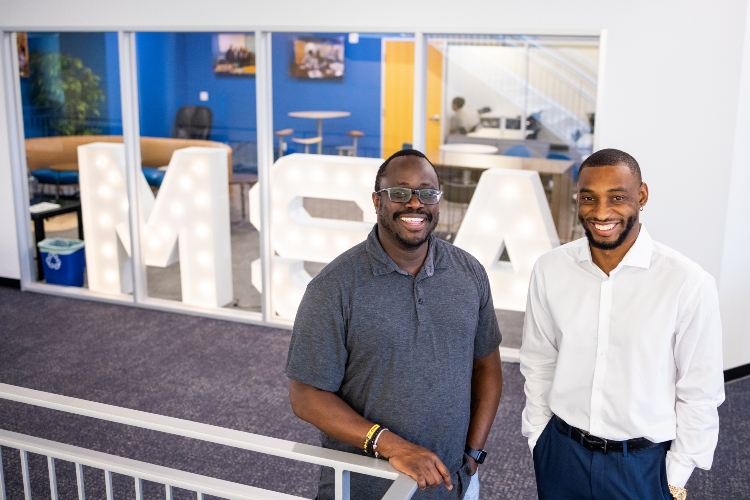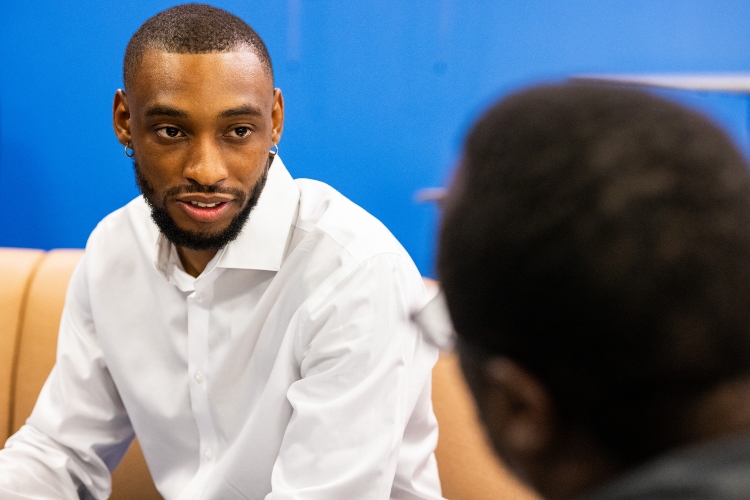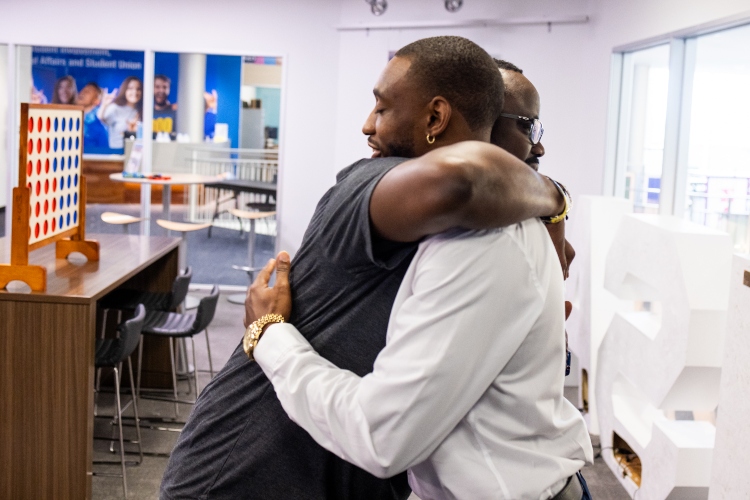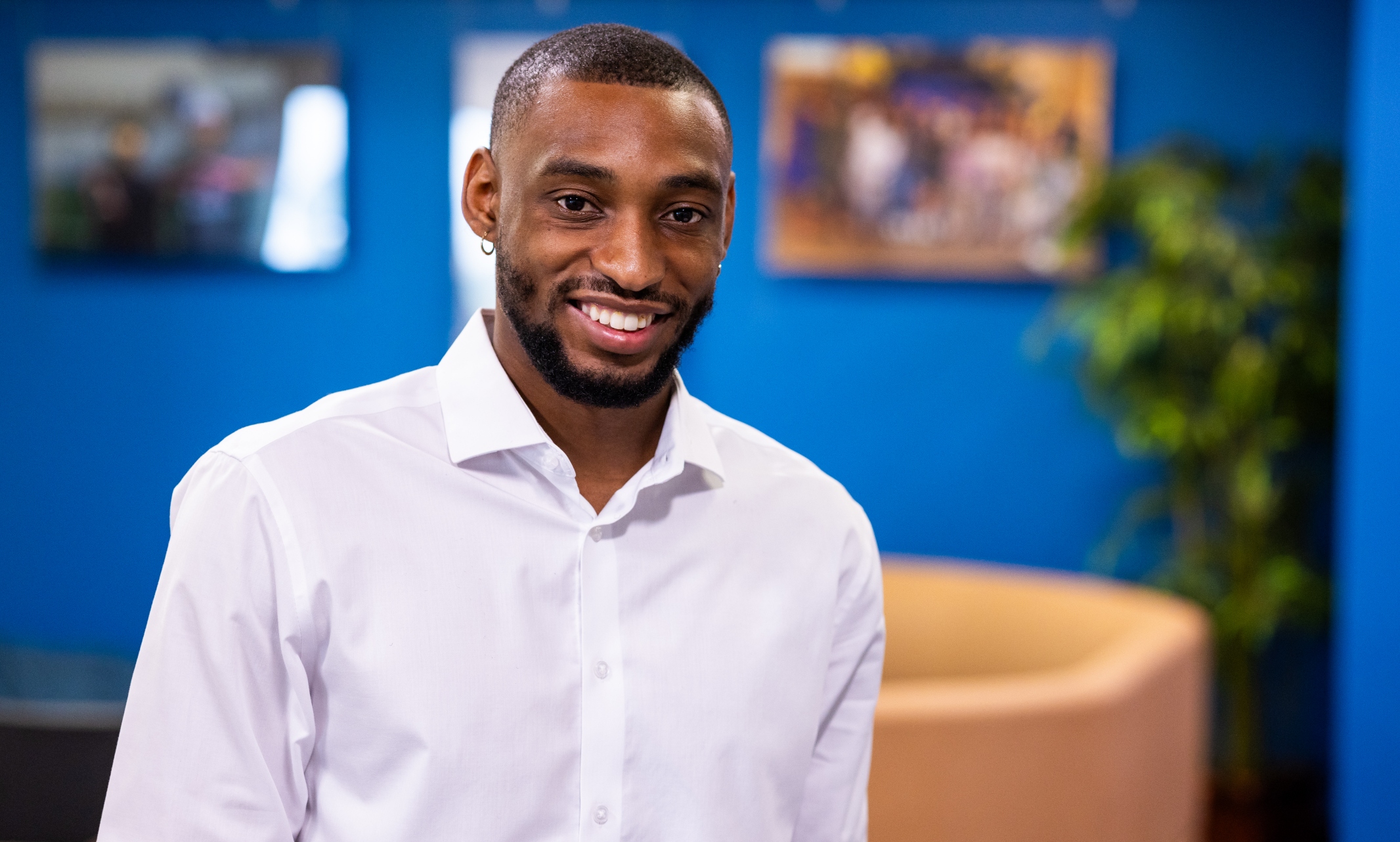Aijalon Edwards knows exactly what he wants to do.
After serving four years in the United States Air Force, he knew that mental health resources were vital for veterans. He decided to pursue a degree in psychology to help veterans and the Black community.
Edwards had heard from people who attended UMKC that it was culture-driven, which he valued. He also needed a program that was flexible because he was leading a security company and is a single father.
At first, he struggled making the transition to school, and even considered dropping out, but then he learned what it meant to find his community here. Edwards met Roland A. Hemmings Jr. (B.A. ’05, M.A. ’12, Ed.D. ’21), the assistant director of Multicultural Student Affairs, during First Semester Experience.
“He became a mentor to me,” Edwards said. “He informed me about the office when he saw I was struggling…He is the reason I have not given up; one of the biggest and most humbling relationships God has blessed me with since starting this journey at UMKC.”

At Hemmings's suggestion, Edwards started getting involved in student organizations. He joined the African Americans Cultivating Excellence (AACE) mentoring program, which offers professional and peer mentoring, academic support, workshops and activities. He also joined the Men of Color Academy, a cohort program that promotes personal growth and prepares members for a successful transition into life after college. And he started accessing the services offered by the Office of Student Veteran Support Services, which helped him navigate his military educational benefits and provided social activities, even ones his kids could attend with him. For Edwards, his UMKC community changed his student experience.
“Having people around you with the same goals and backgrounds can keep your head in the game and keep you from wanting to give up,” Edwards said. “Also, having so many different cultural outlooks or mindsets can better shape who you are as a person by giving you different perspectives.”

The programs and organizations Edwards joined also helped him learn how to navigate higher education, find resources and encouraged him to ask for help. At first, Edwards said, he was apprehensive to reach out to faculty because of his background.
“I’m from the military, where you don’t talk above your rank,” he said.
At the encouragement of people in his organizations, he talked with faculty and found they were understanding, approachable and helpful.
“It took a lot of weight off my shoulders,” Edwards said. “The most common reason you'll hear for networking is all the opportunities it can provide…however, building relationships with people who have gone through similar struggles and successes can lead to strong and lasting connections, essentially becoming a second family, which, to me, matters much more.”
While student organizations, and the community they provided, helped Edwards, Hemmings is the first to say that Edwards is the key to his own success.
“Ultimately, AJ’s success is a reflection of his own dedication and hard work, and I'm simply here to help him realize what is already inside him,” Hemmings said. “AJ is a hardworking student, dedicated to making a difference in his family's life and studies. I’m impressed by his resilience in the face of challenges, and his ability to balance academics with all his other responsibilities.”
Edwards says being a non-traditional student has its challenges, and he still sometimes finds it tough to summon all the energy it requires to manage school, a team at work and parenting, but the support he’s gained has helped him stay determined and give himself grace.
“The best advice I could give anyone who wants to go back to school is, there is never a good time to go back,” Edwards said. “You have to force it to fit your agenda, and your path is never clear and sometimes life just gets in the way. Be thankful for what you can do and do not stress over the things not in your control. Humble yourself and accept that you’re amazing for walking this journey. It took me meeting a wonderful professor to realize that.”
While there may be setbacks, Edwards said, that’s not always a bad thing.
“Sometimes you may not realize it, but the rain helps. Hold your head straight. A brick a day will pave the way.”

